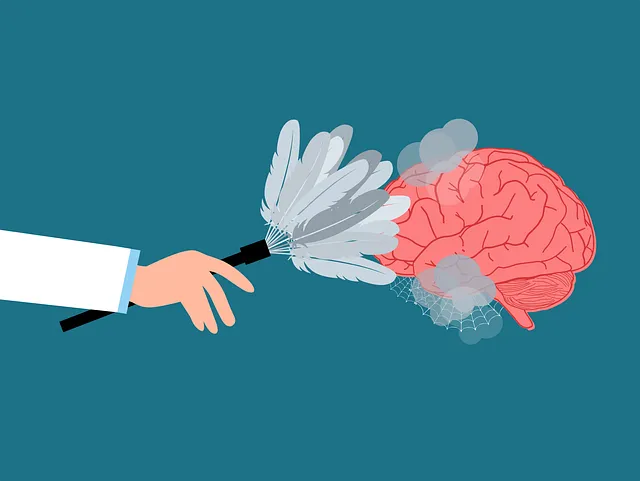Westminster and Kaiser, providing inpatient mental health services, exemplify the importance of cultural sensitivity in healthcare. By acknowledging diverse cultural backgrounds and implementing tailored care plans, these institutions enhance patient resilience, communication, and relationships. Their distinct treatment philosophies—Westminster's acute care vs. Kaiser's holistic mood management—highlight the need for culturally sensitive practices to improve outcomes, especially in managing mood disorders. Integrating social skills training, culturally meaningful self-care, and resilience-building techniques benefits patients from various backgrounds, fostering belonging and equitable mental healthcare.
In today’s diverse society, cultural sensitivity in mental healthcare is paramount. The practice of psychotherapy must adapt to meet the unique needs of individuals from various backgrounds. This article explores the importance of cultural competence within the field, examining key cases like Westminster vs. Kaiser to highlight disparities in inpatient mental health services. We delve into how cultural considerations significantly impact treatment outcomes and present strategies for clinicians to enhance their cultural sensitivity, ensuring effective care for all.
- Understanding Cultural Sensitivity in Mental Healthcare
- The Need for Culturally Competent Practice
- Westminster vs Kaiser: Inpatient Mental Health Services
- Impact of Cultural Considerations in Treatment Outcomes
- Strategies for Enhancing Cultural Sensitivity in Clinical Settings
Understanding Cultural Sensitivity in Mental Healthcare

Cultural sensitivity is a cornerstone of effective mental healthcare practice, ensuring that services are accessible and tailored to meet the diverse needs of patients from various backgrounds. It involves recognizing and appreciating the unique cultural beliefs, values, and practices that shape individuals’ experiences of mental health and illness. This understanding is particularly crucial in institutions like Westminster, where Kaiser offers inpatient mental health services, catering to a diverse patient population.
By adopting culturally sensitive approaches, healthcare providers can build resilience within their practice. They become better equipped to navigate complex cultural landscapes, avoid burnout, and implement effective mood management strategies. For instance, understanding cultural nuances can help professionals tailor therapeutic interventions, improve communication, and foster stronger therapeutic alliances, ultimately enhancing the overall well-being of patients.
The Need for Culturally Competent Practice

In today’s diverse society, cultural sensitivity in mental healthcare is more crucial than ever. As institutions like Westminster and Kaiser handle inpatient mental health services, it becomes imperative to address the unique needs of a wide range of patients. A culturally competent practice recognizes and respects the differences in values, beliefs, and communication styles across various ethnic, racial, and social backgrounds. This approach ensures that every patient receives care tailored to their specific cultural context, fostering trust and improving treatment outcomes.
The integration of resilience-building techniques and burnout prevention strategies for healthcare providers is integral to this process. By implementing these measures, mental health professionals can create a supportive environment that enhances patients’ mood management capabilities while also safeguarding their own well-being. This holistic approach not only benefits individual patients but contributes to the overall effectiveness and sustainability of mental healthcare services, especially in large organizations like Kaiser.
Westminster vs Kaiser: Inpatient Mental Health Services

When comparing mental health care services between Westminster and Kaiser, a notable difference lies in their approach to inpatient treatment. Both organizations prioritize patient care, yet their structures and philosophies vary. Westminster typically offers a more traditional hospital setting for severe cases, focusing on acute care and stabilization, especially for patients experiencing psychotic episodes or suicidal ideation. This method ensures immediate and intense intervention through round-the-clock monitoring and specialized therapy sessions tailored to individual needs.
In contrast, Kaiser’s inpatient mental health services lean towards a holistic model. They emphasize not just treating symptoms but also fostering empathy and understanding within diverse patient populations. By providing a supportive environment, Kaiser aims to help patients develop effective coping mechanisms for long-term mood management. This approach, often involving group therapy sessions, focuses on building resilience and promoting anxiety relief through social connection and shared experiences, addressing the whole person rather than just their symptoms.
Impact of Cultural Considerations in Treatment Outcomes

Incorporating cultural sensitivity into mental healthcare practice significantly impacts treatment outcomes, as it ensures that services are tailored to meet the unique needs of diverse patient populations. Understanding cultural nuances allows healthcare professionals to provide more effective care, fostering better engagement and adherence to treatment plans. For instance, Westminster and Kaiser’s inpatient mental health programs must consider the diverse cultural backgrounds of their patients to offer relevant support. This is particularly crucial in managing mood disorders, where cultural factors can influence symptoms and response to treatment.
By integrating cultural considerations into risk management planning for mental health professionals, institutions like Westminster and Kaiser can enhance conflict resolution techniques and improve overall patient outcomes. Effective cultural sensitivity training equips practitioners with the skills to navigate complex interpersonal dynamics, ensuring that every patient receives respectful, culturally competent care. This approach not only benefits individual patients but also contributes to the broader goal of delivering equitable mental healthcare services.
Strategies for Enhancing Cultural Sensitivity in Clinical Settings

In clinical settings like Westminster or Kaiser’s inpatient mental health facilities, enhancing cultural sensitivity is paramount to providing effective care. One key strategy involves integrating Social Skills Training tailored to diverse cultural backgrounds. This approach ensures that patients from various ethnic, racial, and socioeconomic groups receive support for their unique social and communication needs, fostering a sense of belonging and understanding within the healthcare environment.
Additionally, promoting Self-Care Practices and Routine Development for Better Mental Health is integral to cultural sensitivity. Encouraging patients to incorporate culturally meaningful self-care routines can significantly impact their overall well-being. This might include practices such as mindfulness techniques rooted in specific cultures or traditional healing arts that complement Western therapeutic methods. Such personalized approaches not only respect individual identities but also enhance treatment adherence and outcomes, ensuring patient satisfaction and improved mental health.
In conclusion, cultural sensitivity is a cornerstone of effective mental healthcare practice. As demonstrated by comparing Westminster and Kaiser’s inpatient services, culturally competent care significantly improves treatment outcomes. By understanding diverse cultural contexts, healthcare providers can tailor their approaches to meet individual needs, fostering better engagement and positive outcomes. Implementing strategies to enhance cultural sensitivity in clinical settings, as discussed in this article, is essential for providing equitable mental health services that resonate with every patient’s unique background.






